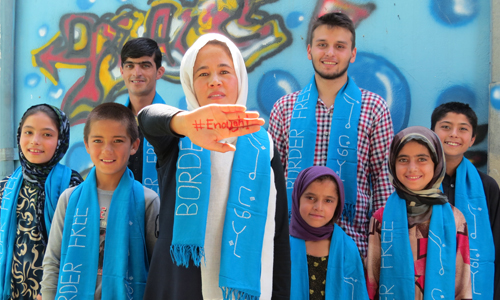Last Thursday, a Taliban 12-member delegation led by political deputy Mullah Abdul GhaniBaradar went to Islamabad and met with Pakistan’s Foreign Affairs Minister Shah Mahmood Qureshi. In response to the event, Kabul called Islamabad to destroy the terrorist’s safe haven in Pakistan instead of hosting them in the country. Speaking at a news conference in Kabul yesterday (Thursday, 9pm), the Presidential Spokesman Sadiq Siddiqui said that the Taliban’s visit to Pakistan and holding meetings in Pakistan would not help the peace process. According to Mr. Siddiqui, this process can produce no results unless its ownership and leadership is in the hands of the Afghan government. “Unfortunately, the Taliban do not desist from violence, during election they attacked on different areas, threatened our elections and still persist in killing people,” he added. “Still we do not see any commitment from Taliban on peace process.”
The president’s spokesman also emphasized that there is still a large number of terrorist’s safe havens in Pakistan threatening security of Afghanistan and region. “The presence of safe havens, training centers and equipping Taliban fighters and dozens of other terror groups is a major challenge and obstacle to stability in the region and security in Afghanistan,” he added. He said that so far Pakistan has not taken any practical action in this regard. Mr. Siddiqui called to Pakistani government that “hosting a group that is still perpetrating violence is against all principles and relations between states”, especially Afghan government. The Afghanistan’s constant demand from Pakistan is to destroy the terrorists’ safe havens and play a positive role in Afghan peace and regional security.
It is worth noting that the Taliban delegation headed by Mullah Baradar was officially invited by Islamabad. According to Soheil Shahin, a spokesman for the Taliban’s political office in Qatar, the delegation was going to talk to Pakistani officials about “a series of important issues”. At the same time, Pakistani media also reported that Zalmay Khalilzad, the US State Department’s special envoy for peace in Afghanistan, also went to Islamabad to discuss about peace revival with Islamabad and Taliban, and reportedly both sides have agreed on resumption of the US and Taliban negotiation. As reports quoted from Mahmoud Qureshi, he urged “the existing regional and international consensus for achieving peace in Afghanistan is an unprecedented opportunity that should not be missed and the realization of this opportunity is at hands of the parties involved in Afghanistan.”
After cancellation of the US-Taliban talks, it was the fourth trip that Taliban made to regional countries including Russia, Iran, China and now Pakistan. The Taliban trip to Pakistan is meaningfully simultaneous with presence of Zalmay KhalilZad in Pakistan. According to most Afghan experts, Zalmay Khalilzad has never had an impartial and successful achievement in Afghanistan’s issues. During the nine months of negotiations, he could marginalize the government of Afghanistan while legitimize the Taliban, but fortunately the game ended with a tweet from the US president. If the so-called peace succeeded and if the presidential election postponed because of unknown peace, then no one knows what would have happened in the country, now.
From this point of view, holding the presidential election was a great historic step for the Afghan people crossing from a difficult and uneven political hill. Almost no one believed in the elections, everyone wanted something different from the peace process, and saw the election as an obstacle to achieving their illegitimate demands. But the Afghan government untiringly resisted against all dilemmas and called that election was the only way out of the crisis.Now that the elections have been held and we are on the verge of forming a legitimate and elected government, there is no excuse to bypass the Afghan government and marginalize it. Zalmay Khalilzad has directly gone to Pakistan without any consultation with Afghan government though the Afghan election has not yet been announced and the Afghan president is still considered as a candidate. Principally, first he must have had consultation with the leadership of Afghan government and then to Islamabad or met with Taliban.
During the entire peace negotiation process, the only legitimate demand of Afghan people from the government of the United States and Mr. Khalilzad himself was that he should continue the peace process in consultation and coordination with the leadership of the Afghan government, but unfortunately this was always denied and the Afghan government and people have always been far behind the peace process. Therefore, the failure of Khalilzad’s peace process with the Taliban was foreseeable because the Afghan people and government had no place in the process. His main counterpart was representatives of the Taliban who neither believed in peace and nor had enough authority for decision making. In every case, they had to regularly coordinate with sources in Pakistan, and eventually reached a vague agreement with a US special envoy that ultimately failed to work out.
Now, what has just started in Islamabad seems to be the continuation of Qatar’s failed game and its defeat is predictable from now on. The reason is the process has restarted based on previous method which is marginalized the Afghan government and people. Undoubtedly, if the peace process is carried out in the absence of the Afghan government and people, and the Afghan government has no core ownership then the failure is certain. Everyone should know that unless the Afghan government is at the core of peace process and unless Taliban show a clear determination for realization of peace in the country, any peace action will lead to failure.
Home » Opinion » No Peace is Feasible in Absence of Government in Afghanistan
No Peace is Feasible in Absence of Government in Afghanistan
| Mohammad Zahir Akbari

